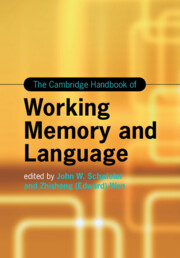Book contents
- The Cambridge Handbook of Working Memory and Language
- Cambridge Handbooks in Language and Linguistics
- The Cambridge Handbook of Working Memory and Language
- Copyright page
- Contents
- Figures
- Tables
- About the Editors
- About the Contributors
- Acknowledgments
- Overview of the Handbook
- Part I Introduction
- Part II Models and Measures
- 3 The Evolution of Working Memory and Language
- 4 The Phonological Loop as a “Language Learning Device”
- 5 The Embedded-Processes Model and Language Use
- 6 Long-Term Working Memory and Language Comprehension
- 7 The Cognitive Neuroscience of Working Memory and Language
- 8 Computational Models of Working Memory for Language
- 9 The Time-Based Resource Sharing Model of Working Memory for Language
- 10 The Ease of Language Understanding Model
- 11 Assessing Children’s Working Memory
- 12 Measuring Individual Differences in Working Memory Capacity and Attention Control and Their Contribution to Language Comprehension
- Part III Linguistic Theories and Frameworks
- Part IV First Language Processing
- Part V Bilingual Acquisition and Processing
- Part VI Language Disorders, Interventions, and Instruction
- Part VII Conclusion
- Index
- References
6 - Long-Term Working Memory and Language Comprehension
from Part II - Models and Measures
Published online by Cambridge University Press: 08 July 2022
- The Cambridge Handbook of Working Memory and Language
- Cambridge Handbooks in Language and Linguistics
- The Cambridge Handbook of Working Memory and Language
- Copyright page
- Contents
- Figures
- Tables
- About the Editors
- About the Contributors
- Acknowledgments
- Overview of the Handbook
- Part I Introduction
- Part II Models and Measures
- 3 The Evolution of Working Memory and Language
- 4 The Phonological Loop as a “Language Learning Device”
- 5 The Embedded-Processes Model and Language Use
- 6 Long-Term Working Memory and Language Comprehension
- 7 The Cognitive Neuroscience of Working Memory and Language
- 8 Computational Models of Working Memory for Language
- 9 The Time-Based Resource Sharing Model of Working Memory for Language
- 10 The Ease of Language Understanding Model
- 11 Assessing Children’s Working Memory
- 12 Measuring Individual Differences in Working Memory Capacity and Attention Control and Their Contribution to Language Comprehension
- Part III Linguistic Theories and Frameworks
- Part IV First Language Processing
- Part V Bilingual Acquisition and Processing
- Part VI Language Disorders, Interventions, and Instruction
- Part VII Conclusion
- Index
- References
Summary
Working memory’s limited capacity places significant constraints on people's ability to hold information while processing. However, skilled readers are able to effectively encode important information into long-term memory during comprehension. This chapter describes the long-term working memory theory (LT-WM), originally developed to explain how experts in various domains (including reading) enhance their working memory capacity by relying on rapid, skilled use of long-term memory. We first trace the development of the theory and the reasons it took the form it did in the mid-1990s. We explain that LT-WM was not viewed as a new form of memory, but rather as highly practiced use of long-term memory to rapidly and reliably link information together using meaningful associations, retrieval structures, and preexisting knowledge. Next, we describe how the theory accounted for many central phenomena in discourse comprehension. More recent work has proposed a form of LT-WM for syntactic processing as well, and we discuss current critiques of the original evidence advanced to support LT-WM. Finally, we describe recent studies on neural activity associated with LT-WM development in reasoning skills and language comprehension.
Information
- Type
- Chapter
- Information
- The Cambridge Handbook of Working Memory and Language , pp. 98 - 119Publisher: Cambridge University PressPrint publication year: 2022
References
Accessibility standard: Unknown
Why this information is here
This section outlines the accessibility features of this content - including support for screen readers, full keyboard navigation and high-contrast display options. This may not be relevant for you.Accessibility Information
- 2
- Cited by
